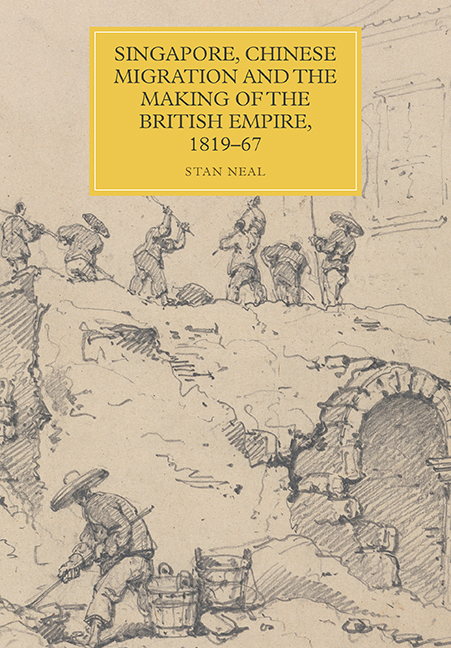Book contents
- Frontmatter
- Dedication
- Contents
- List of Illustrations
- Acknowledgements
- Language Usage
- Chronology: Singapore, the British Empire and Anglo-Chinese Relations, 1819–67
- Map
- Introduction
- Chapter 1 The Singapore Model
- Chapter 2 The Chinese Character: Race, Economics, Colonisation
- Chapter 3 Crossing the Indian Ocean: Chinese Labour in South Asia and Beyond
- Chapter 4 From Singapore to Sydney: Race, Labour and Chinese Migration to Australia
- Chapter 5 Hong Kong versus Singapore: The Dawn of Mass Migration
- Conclusion
- Bibliography
- Index
- Miscellaneous Endmatter
- Frontmatter
- Dedication
- Contents
- List of Illustrations
- Acknowledgements
- Language Usage
- Chronology: Singapore, the British Empire and Anglo-Chinese Relations, 1819–67
- Map
- Introduction
- Chapter 1 The Singapore Model
- Chapter 2 The Chinese Character: Race, Economics, Colonisation
- Chapter 3 Crossing the Indian Ocean: Chinese Labour in South Asia and Beyond
- Chapter 4 From Singapore to Sydney: Race, Labour and Chinese Migration to Australia
- Chapter 5 Hong Kong versus Singapore: The Dawn of Mass Migration
- Conclusion
- Bibliography
- Index
- Miscellaneous Endmatter
Summary
The year 2019 marks 200 years since the East India Company established a trading post on the island of Singapore. The conventional, historical narrative of the colonial experience emphasises how, by 1867, British colonisation had transformed this island of roughly 1,000 inhabitants into a centre for international trade and home to over 80,000 people, over two-thirds of whom were Chinese or descended from Chinese migrants. Clearly, as we reflect on this bicentenary, we can see that the British Empire transformed Singapore. However, this book focuses on the role of early colonial Singapore in the transformation of the British Empire. The central argument is that the colonial experience in Singapore shaped British ideas about colony building. In fact, the rapid growth and commercial success of early colonial Singapore led to various attempts to reproduce this colonial model through the recruitment of Chinese migrant labour. These attempts to replicate colonial Singapore were based on contemporary assumptions and ideas about race, economics and colonisation and contingent on rapid imperial and global change in the nineteenth century.
The Straits Settlements of Penang (ceded to the British in 1786), Singapore (ceded in 1824) and Malacca (ceded in 1824) were the first British colonies to rely on Chinese migrants, as both a labour force and a class of wealthy merchants. Originally under the auspices of the East India Company, the economic success and political significance of these colonies meant that the Straits Settlements were granted Crown Colony status in 1867. Within this context the growth of Singapore was particularly important. The contact zone of Singapore, which grew rapidly in terms of economic output and population from 1819 onwards, confirmed the idea that Chinese migrants were compatible with British colonialism and thus served as an example to colonial and metropolitan observers. Because of its success, Singapore became a template for migration to different colonial contexts. Chinese migration in the nineteenth century fits within a wider framework of empire building. Whilst colonial administrators celebrated the Chinese as an essential component of colonial Singapore's economic miracle, they maligned indigenous peoples as an obstacle to colonial development. As a result, colonial observers saw Chinese migrants as an economically productive replacement for indigenous populations.
- Type
- Chapter
- Information
- Publisher: Boydell & BrewerPrint publication year: 2019



